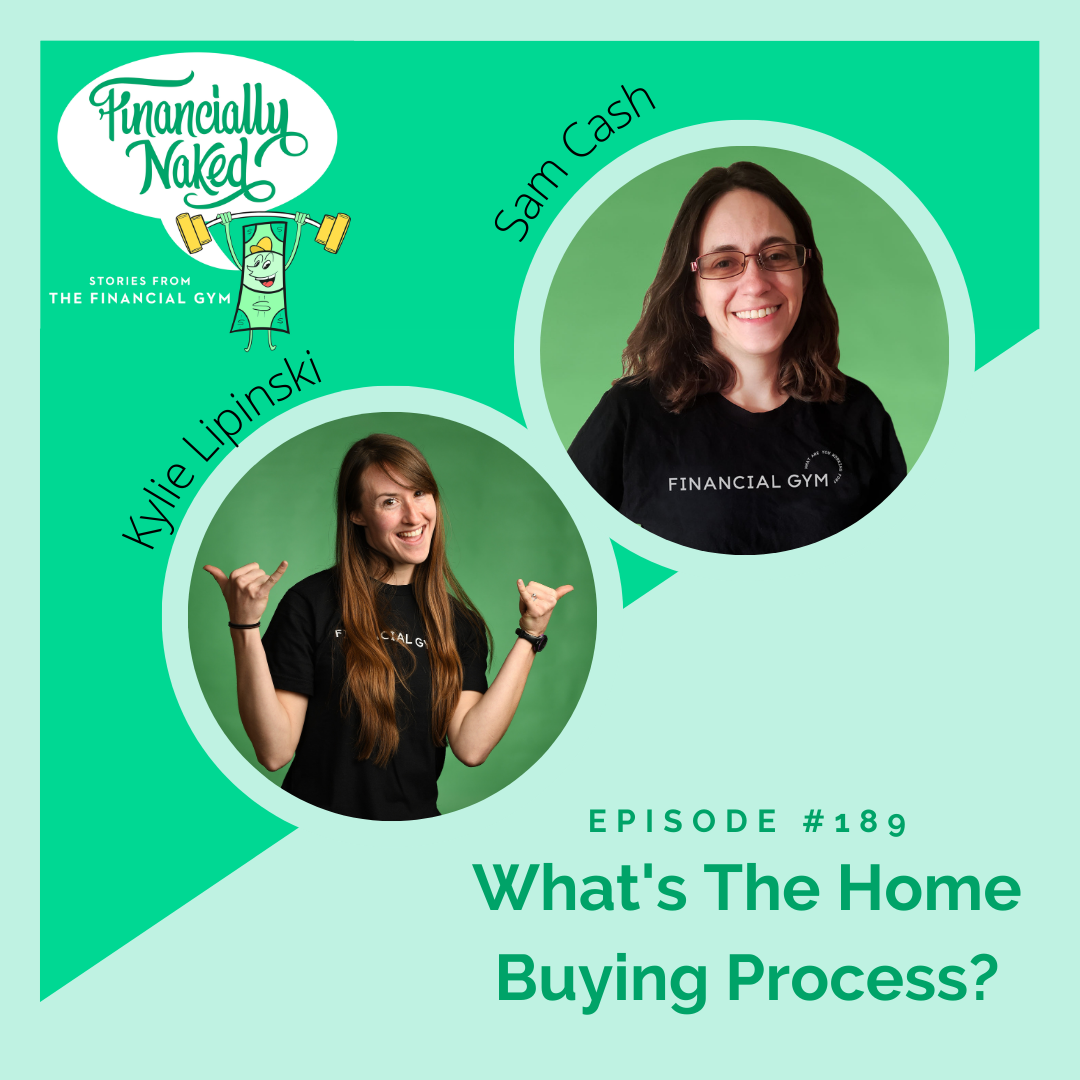What is The Home Buying Process? with Kylie & Sam
On this episode of Financially Naked: Stories from The Financial Gym, our hosts are Kylie and Sam, two Certified Financial Trainers at The Financial Gym. One of the most common goals among clients at The Gym is home ownership, so today we're diving into the basics of the home buying process.
As Financial Trainers and prospective homeowners, Sam and Kylie will guide you through finding the right realtor, getting preapproval, and navigating the journey to closing. Whether you're a first-time buyer or looking to move, these practical tips and insights will help you make your home buying dreams a reality!
Podcast Notes
An important step is finding a great real estate agent because they will guide you through the process, and you want a solid relationship with them. This is one of the most significant purchases of your life, and you want to feel comfortable asking questions.
Referrals are a great way to find someone. You can ask friends, family, and colleagues for recommendations.
Read reviews, check out their social media, and set up interviews so you can gauge their communication style, responsiveness, and compatibility with your needs.
Remember to discuss the agent's fees and commission structure upfront.
The Budgeting Process
Knowing how much you can afford when purchasing a home is essential to avoid stress and ensure a smooth process. Remember to consider the mortgage, property taxes, HOA fees, insurance, maintenance and other costs. A Financial Trainer can help you with this.
Determine how much you can afford to put towards a down payment. A larger down payment typically leads to a lower monthly mortgage payment.
There are online mortgage calculators that can help you estimate your potential monthly mortgage payment. This will give you an idea of what to expect.
Research the property tax rates in the area where you plan to buy.
Factor in the cost of homeowners insurance, which is typically required by lenders. This protects your investment in case of damage or loss.
Don't forget to plan for other housing-related expenses like maintenance, utilities, and homeowner association fees.
The Pre-Approval Process
A mortgage pre-approval is when a lender evaluates your financial and credit information to determine the maximum amount they are willing to lend you.
You will need certain financial documents (specifics will depend on the lender), such as pay stubs, tax returns, bank statements, income verification letters, and other documentation showing your income, assets, and debts.
The lender will perform a credit check to assess your credit score and history, so unfreeze it if you have frozen it in the past.
You will receive a pre-approval letter if you meet the lender's criteria. This letter details the loan amount you are approved for, the duration of the pre-approval, and any conditions. With that letter, you can confidently house-hunt within your budget, and sellers will take you more seriously.
Different Types of Mortgages
Choosing the right type of loan for you will depend on your budget, where you live, your lender, and other eligibility requirements.
Fixed-Rate Mortgage (FRM): The interest rate remains constant (fixed) throughout the loan term. They have predictable monthly payments and are usually available in 15-year and 30-year terms.
Adjustable-Rate Mortgage (ARM): The interest rate fluctuates periodically based on market conditions. Initial rates are often lower than fixed-rate mortgages but can increase over time.
FHA (Federal Housing Administration) Loan: These are insured by the FHA, offering more accessible qualification requirements for buyers. The down payment can be as low as 3.5% of the purchase price.
VA (Veterans Affairs) Loans are exclusively available to eligible veterans, active-duty service members, and spouses. Usually, no down payments are required, and they have other benefits.
A Combo or Piggyback Mortgage involves taking out two separate loans to avoid paying private mortgage insurance (PMI).
Other examples:
Conventional Mortgage
USDA (United States Department of Agriculture) Loan
Jumbo Loan
Interest-Only Mortgage
Balloon Mortgage
The Offer Process
You will work with your real estate agent to determine a competitive and reasonable offer, and they'll help you draft the formal offer letter. The offer letter includes the offer price, proposed terms (contingencies), and the proposed closing timeline.
Common contingencies may include a home inspection and appraisal.
Once you and your agent have reviewed the offer letter, submit it to the seller's agent or directly to the seller if they don't have an agent.
The Post-Offer Process
The seller will review your offer. They may accept the offer, make a counteroffer, or reject it outright. If they counter your offer, you can negotiate the terms and price.
Once both parties agree on the terms and price, the seller will sign the acceptance, and you'll have a purchase agreement.
After the offer is accepted, you'll enter the escrow period. The necessary inspections, appraisals, and other due diligence happen during this time.
Hire a qualified home inspector to assess the property's condition. Depending on the findings, you may negotiate repairs with the seller.
The lender will order an appraisal to determine the property's value to calculate the loan amount. They'll do a final review of your documents before finalizing the mortgage.
On the closing date, you will sign all the paperwork, pay the closing costs and down payment, and officially take ownership of the property.
Final thoughts
It is okay if you have to look at a bunch of houses or put in many offers. The market has been competitive, and you just have to keep moving forward and not get discouraged.
Each real estate transaction is unique, and the process may vary based on local laws, regulations, and individual circumstances.
If you want to work with a Certified Financial Trainer to purchase a home, schedule a free warm-up call today! If you have any ideas or questions for the show, send an email to trainerpodcast@fingyms.com.
Resources
Meet The Trainers
Meet Sam Cash, Level 2 Certified Financial Trainer Meet Kylie Lipinski, Level 2 Certif

